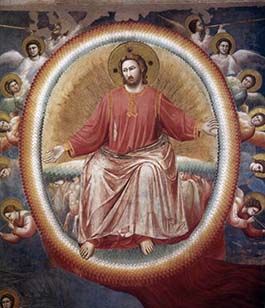Why would God create someone who will choose hell?
- MSGR. CHARLES POPE
If God knows a person will do evil and therefore end up in hell, why would God create a person he knows will make this decision?
 Consider the premise of the question: "God at Time A considers making a person at Time B whom he knows at Time C will go to hell." This sequence troubles us and makes us believe that God should not do this. But this puts God in chronological time, where he does not operate. So the presumption of our question is flawed and our conclusion that it is wrong for God to do this is simplistic.
Consider the premise of the question: "God at Time A considers making a person at Time B whom he knows at Time C will go to hell." This sequence troubles us and makes us believe that God should not do this. But this puts God in chronological time, where he does not operate. So the presumption of our question is flawed and our conclusion that it is wrong for God to do this is simplistic.
Nevertheless we can ponder a partial answer to our question by considering some aspects that would emerge if God were to refuse to create anyone who would go to hell. What would this do to human freedom? If God only created human beings he knew would go to heaven and refuse to create souls that would reject his offer of heaven, this would front-load the process and, in effect, cancel our freedom. If God only created the obedient, could we really say that obedience was any longer possible or had any real significance? No, because God has loaded the dice and decided beforehand that the disobedient aren't even allowed to exist. They cannot prefer something other than God's kingdom because they aren't even here to do that. Actual choices are necessary for actual freedom. And freedom is necessary for there to be love. Hence, our scenario cancels out the whole basis of human freedom and the possibility of making a free choice to love God and choose his kingdom with his principles and values.
This also reveals the second problem with our scenario: It deals a blow to human dignity. Freedom is an essential component of our dignity. Without it we are reduced to slaves with no real choice since everything leads to only one solution or destination.
Finally, our scenario that it is wrong for God to create anyone he knows will go to hell overlooks that our lives are not just about ourselves. It is true I exist for my own sake. But it is also true that I am part of a bigger picture where my existence interacts with other people and events. In the aftermath of original sin, God allows the interaction of the good and wicked, the heaven-bound and the hell-bound, to influence and shape the members of his body. Hence, God permits trials, difficulties; even our enemies and those who reject God all have a role in our lives. This is a mysterious aspect of God's providence. He can draw good even from evil situations or people. Canceling their existence would affect not only them but us, who, we pray, are heaven-bound.
Thus, without fully solving the questions you raise, these considerations ask us to consider the implications of our "solutions" to the perceived problem. In the balance of his providence, God is holding a lot of things together: freedom to choose and love, human dignity and the role of adversity, among many other things we do not see.
 This is J. Fraser Field, Founder of CERC. I hope you appreciated this piece. We curate these articles especially for believers like you.
This is J. Fraser Field, Founder of CERC. I hope you appreciated this piece. We curate these articles especially for believers like you.
Please show your appreciation by making a $3 donation. CERC is entirely reader supported.

Acknowledgement
 Msgr. Charles Pope. "Why would God create someone who will choose hell?" Our Sunday Visitor (February 8, 2022).
Msgr. Charles Pope. "Why would God create someone who will choose hell?" Our Sunday Visitor (February 8, 2022).
Reprinted with permission from Our Sunday Visitor. Image credit: Giotto, Public domain, via Wikimedia Commons.
The Author
Msgr. Charles Pope is currently a dean and pastor in the Archdiocese of Washington, D.C., where he has served on the Priest Council, the College of Consultors, and the Priest Personnel Board. Along with publishing a daily blog at the Archdiocese of Washington website, he has written in pastoral journals, conducted numerous retreats for priests and lay faithful, and has also conducted weekly Bible studies in the U.S. Congress and the White House. He was named a Monsignor in 2005.
Copyright © 2022 Our Sunday Visitor

